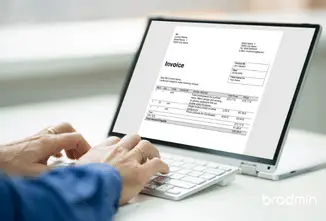The past few years, more and more businesses have started to outsource, relying on freelancers like you to deliver quality work.
Oftentimes, clients fail to acknowledge the significance that freelancers attach to being paid on time. This is where the dilemma arises. Whether it’s for one reason or another that client’s resort to making late freelance payments, you suffer financial hardship.
Let’s look at how as a freelancer you can avoid such situations or resolve this predicament if you find yourself in it.
In this article:
6 ways to combat late freelance payments
As a successful freelancer, you can recognize and avoid situations where the chances of late payments are high. There are no hard and fast rules or guidelines that need to be followed. If you have recently joined the circuit, consider some basic ideas may help prevent late freelance payment.
1Research the reputation of the client with other freelancers
Committing to new freelancing projects can be understandably intimidating.
There exists the possibility of work ethics not coinciding with one another. You may even feel the accentuating probability of late payments or missing payments when working with a client in the absence of a trusting relationship.
To counter this, and to gain an understanding of what the new client is like, we recommended that you should conduct a comprehensive research. This research should be aimed at double-checking the information provided by your client. It should also help to analyze the general reputation of the client in the freelancing world.
If the client is reviewed negatively by other freelancers that have worked with them in the past, it may be a wise decision to evaluate the freelancing deal again.
In the case of the client being reliable and dependable, the chances of late freelance payments being made are reduced drastically.
Many clients also approach freelancers through a freelancing platform. In this situation, checking your potential new client’s profile on that platform should give you some idea of how they treat freelancers. It would give insight into the client’s payment history and verified contact details.
2Maintain a good correspondence with your client
Being consistent in the correspondence with a client is also amongst the factors that contribute to reducing the chances of late payments. If your client believes that you have delivered high-quality work, the chances of delayed payments also decrease substantially.
Moreover, through frequent and pleasant interactions, both you and your client can deduce the expectations that the other party has. Through successful and consistent interactions, you can convey the significance of timely payments to your client in return for high-quality services.
3Work out your payment plan with your client
A payment plan decides the exact amount of payment to be received against each completed task (if more than one). The mode of payment and how it will be made is a very crucial aspect.
Most clients have a fixed way to approach payments. As a freelancer, you need to be mindful of how your client is comfortable with making the payments, and whether it aligns with how you want it.
An example of a predicament that often arises is the difference in the preferred way of transferring funds. Your client may prefer to send payment through PayPal or any other money transferring agent, whereas you may want to get paid through simple bank transfer. This discrepancy contributes significantly to late freelance payments.
4Negotiate a fixed payment deadline with your client
Along with deciding the fixed payment for the task assigned by your client, it is equally essential to decide on a fixed payment deadline as well.
This is not always as easy as it sounds. As a freelancer, you expect your invoices to be paid on time. Whereas, for a client, arranging payment may be contingent on several different factors.
The deadline can even be a range of selected days of a month. The benefits of this fixed deadline will be to both parties. You will rest assured knowing that your client will abide by the deadline and will make payments before it elapses.
On the other hand, your client will be free from reminders and prompts from you asking to be paid.
Along with the avoidance of late freelance payments, respecting this fixed deadline will also have a positive impact on the relationship you share with the client. This will allow you to enhance feelings of trust towards one another.
5Start with smaller claims
Making smaller claims leading up to the full payment is an effective strategy that you can employ to avoid late freelance payments. Oftentimes, your client will have a difficult time arranging for the complete amount of payment that has to be paid to you. This inability then leads to buying more time and ultimately delaying your payment.
The best way for you to work past this issue is by making smaller payment claims to your client.
This will allow your client to spread the payment over a fixed time period without delaying any claim. Our recommendation is to engage in a payment instalment plan with your clients, especially those that owe you a significant amount of payment.
As part of this instalment plan, your client will pay you the due payment in the form of a fixed number of instalments over a fixed period of time. Consequently, this would leave your client no reason to make late freelance payments because of the unavailability of funds.
6Rely on consistent reminders
Sending consistent reminders to your client can prove to be extremely helpful when avoiding late freelance payments. A reminder you send can be as simple as asking your client a tentative date as to when the payment will be made.
Or you can even choose a prompt reminding your client of the approaching payment deadline. There are several ways you can go about this depending on the preferred medium of correspondence.
However, you need to be considerate that the method you choose is non-intrusive and does not disturb your client. Examples of such mediums include emails or brief text messages.
You should refrain from calling your client to remind them of making payments as it may be invasive to your client’s privacy. However, in dire circumstances, it may be the only viable option left for you.
It is pivotal that you remain calm and respectful while sending reminders whilst being consistent.
Your client should not feel suffocated or feel like they’re being bullied into sending the freelance payment. Instead of this, you should focus on writing professional, to-the-point, and efficient reminders.
These will help get the urgency and significance of the matter across to your client without leaving a bitter aftertaste.
The legal help you can pursue in case of late freelance payments
If your client fails to make complete payments before the deadline mentioned on the freelancing contract, you have the liberty to take legal action in court.
This legal action and what it achieves varies depending on the country in question. To obtain your payments, you can file a lawsuit against your client if the payment due date has elapsed and you have still not received any funds.
An example of such a law that protects freelancers from late freelance payments is the “Freelance Isn’t Free” passed in New York City, USA in 2016. As part of this law, clients who do not pay the freelancers on-time are subject to legal consequences.
The law also dictates that for services valued at over $800, a contract must be signed between the two parties. If you’re in New York City and have pending payments, you can surely benefit from this law.
Similarly, in England, the Late Payment of Commercial Debt Act (1988) can be recognized as a law that helps reduce the late freelance payments. This act was further amended in 2002 to add penalties for late payment along with interest.
Under this amended act, it is mandated for your client to make payments to the freelancers within 30 days of submitting the work unless the fixed contract dictates another duration.
Importance of working under a fixed agreement with your client
One of the most important steps that you should take while working with a client is making them sign an official contract.
The contract then has legal significance and thus, consequences on violations. Your contract will include details about the client you work with and yourself, the services that you will provide, the payment terms and conditions that you two decide, alongside the number of days after which payment will be released.
A contract will allow you to take legal action such as suing your client if they refuse to pay or make late freelance payments. A very important clause that a freelancing contract includes is one that recognizes the work done by you as your intellectual property.
Furthermore, you hold copyright claims over this property until the client pays for it according to the terms also described by the contract. Through this, your client will understand that if you are not paid in full or not paid in time, your work can not be utilized legally.
Thus, in order to promote the smooth flow of business activities, your client will be highly likely to abide by the contract and will avoid making late freelance payments.
Will collecting an initial deposit help?
An initial deposit is a percentage of the total payment due in return for your service. The best time to receive an initial deposit is before you begin working on the task assigned by your client. This deposit works as a promise of being paid in full after the work is complete.
To reduce the risk of suffering as a result of getting paid late, it may be a wise decision to request an initial monetary deposit. This deposit also becomes significant as it helps ensure that you will not be at a total disadvantage if your client makes later freelance payments.
Through these deposits, you can supplement the financial flow until full payment is made.
If you have an understanding client, they will also consider the importance of this initial payment and will not create an issue making a small upfront payment. In many circumstances, you can even choose to omit this initial deposit.
Amongst these, if you’re working for a reliable client that you have worked with before. If this client, and others like them, make timely freelance payments, requesting a deposit might not be necessary.
Coordinating both delivering work and late payments
You need to be very mindful of the work submitted to your client and the payment being received alternatively. You need to ensure that a balance is maintained.
Oftentimes, your client will continue to request more work from you without completing the pending payment. Such a situation should immediately warrant your concern.
You should take steps that will safeguard the pending payment. You should work towards conveying the significance of making timely payments to your client in order to avoid legal consequences. There may be many ways of doing this. One of these is to not supply your client with fresh work until the remaining dues are paid in time.
Furthermore, when promoted, you should be very straightforward in expressing the urgency of being paid in time.
You are not making an unfair demand, rather quite the opposite. You are requesting payment in exchange for completing the remaining work. Through this strategy, your client will acknowledge the avoidance of late freelance payments to continue benefiting from services.
If this is an on-going issue, consider reporting unpaid invoices to a late invoice payment directory.
Official invoices and how they ensure timely freelance payments
Official invoices are bills that you generate as a freelancer and send to the client you work for. It informs your client of the detail of the service that you have provided and the exact monetary amount that you are entitled to resultantly. There are several types of invoices that you can issue such as a standard invoice, a recurring invoice, or even a prepayment invoice.
All these serve the same purpose; letting your client know how much payment is owed and the due date that needs to be followed.
By sending an invoice to your client, you make certain that they acknowledge the payment that is due and respects the mutually decided due date. The invoice becomes evidence of the service provided and the money that is due. In case of your client making late freelance payments and discrediting the due date mentioned on the invoice, you are even entitled to charging a late fee.
This fee may be a small percentage of the total payment due and can increase depending on the number of days the payment is delayed.
How freelancers suffer because of late freelance payments
As a freelancer, you should think of yourself as not doing a job but rather doing business. This is because you can enjoy the liberty of choosing who to work with and decide the terms based on a mutual understanding.
Like flourishing a business, you also invest time and effort to deliver high-quality work in return for payments. However, like running a business, freelancers such as you, run into trouble because of late freelance payments. The following are a few of the late freelance payment effects.
Motivation gets affected
As a freelancer, you should think of yourself as not doing a job but rather doing business. This is because you can enjoy the liberty of choosing who to work with and decide the terms based on a mutual understanding.
Like flourishing a business, you also invest time and effort to deliver high-quality work in return for payments. However, like running a business, freelancers such as you, run into trouble because of late freelance payments. The following are a few of the late freelance payment effects.
Finances are influenced
Like many freelancers, your main objective for working is simply to make ends meet. Through the income generated through freelance work, you look forward to paying for various bills such as groceries, electricity, and gas, and rent (if you are a tenant).
During some months, you may even want to contribute a percentage of the payment to your savings. Most of these responsibilities have a due date that needs to be abided by to avoid late payment charges. However, when a client makes late freelance payments, you, unfortunately, have to succumb to missing a deadline.
This ultimately results in increased financial worries along with the late payment fees.
Client – freelancer relationship is affected
Perhaps the biggest loss you face as a result of late freelance payments extends to your client as well. The relationship that you share with your client is severely impacted because of delayed payments.
A reason behind this is because you feel frustrated because of not getting paid inside the promised time limit. What then follows is the possibility of you considering not working with the same client again in the future. In the long term, your client gets left with a reduced number of freelancers to work with.
However, this isn’t the only way your client is impacted. If making late freelance payments becomes a habit, your client loses credibility and potential freelancers. Resultantly, your client may suffer from a shortage of freelancers like you that want to collaborate.
Gender difference in late freelance payments
There are several factors that contribute towards late freelance payments such as the size of your client’s business and the amount of the payment. However, another factor that goes unnoticed whilst listing down these influencers is the gender of the freelancer. Research conducted into investigating the gender differences in late freelance payments yield results unfavourable to female freelancers.
According to results compiled by Bonsai, the percentage of female freelancers who received late freelancer payment was higher than the percentage of male and team freelancers. There were 31% of female freelancers that suffered late payments as compared to 24% of male freelancers and 23% of the team freelancers.
In this research, “late payments” were regarded as payments that were at least a day over the decided due date. Interestingly, these proportions remained the same even when all other influencing factors were kept consistent such as the skill-set possessed by the freelancer and the work experience they held. The reasons behind these gender differences remain unexplored.
How long after completing the work should payments be made?
The duration during which you should generally expect payment for the services you provide will vary from client to client.
The contract that you sign with your client before beginning to work with them dictates this duration. As a freelancer, it will be common for you to sign different contracts with different clients, and thus, this duration will also change accordingly.
Moreover, how long you have to wait for payments is also contingent on the type of service that you provide your client. If the work is short-term or does not require revisions, you should expect prompt payments.
However, if the work is substantial, requires editions, or needs to be completed over a long time, expect the complete payments to take up till a month after submission to get processed.
On the other hand, if you work through a freelancing platform, the payment is usually released within the duration specified in the platform’s terms and conditions.
While working, you need to keep several factors in mind. Alongside putting in the effort to ensure spectacular work, you must also try to minimize the risks associated with receiving payments.
To do this, there are various strategies you can consider such as signing a legal contract, sending consistent reminders, and considering smaller claims. These will help you to combat late freelance payments and thus, make progress as a freelancer.
You can even choose to benefit from the legal assistance that a country’s law provides.
By taking legal action against clients that make late freelance payments, you can claim the pending payment along with interest.
What are you doing to get your invoices paid faster?
Let us know in the comments below.
7 Comments
Comments are closed.




![Apology letter for late payment to supplier [with examples] 5 apology letter for late payment to supplier](https://brodmin.com/wp-content/uploads/2021/09/apology-letter-for-late-payment-to-supplier.webp)
![Invoice payment terms - UK edition 2022 [+ Net calculator] 6 Invoice Payment Terms UK Edition 2021](https://brodmin.com/wp-content/uploads/2021/09/Invoice-Payment-Terms-UK-Edition-2021.webp)






All the advice you shared is spot on. I sometimes have new clients that I can’t find anything about online. It doesn’t matter how much research I do on them, there’s nothing. So, in those cases I can’t know if they will pay on time or not. Whenever dealing with someone new, I try to divide the projects into milestones, the first one being soon after starting (so I can make sure they do pay that first invoice and we build trust). If a client doesn’t agree to these terms then we won’t work together.
Hi Vanessa,
You are right, it is not easy to find anything online if you are looking into someones payment habbits. This is part of why we started the brodin directory.
I am glad to hear that you can invoice your clients via milestones as a solution to built trust. Hope that 2021 will be the best year yet for you! : )
I hope to see this directory grow a lot in the following months and years because we sure need it. Finding more information about as many businesses as possible will prove very helpful. It will also weed out the bad businesses. I know that some will just change names but this is a start, no.
Thanks for the nice wishes! Hope you have a wonderful 2021 as well!
I like to triple check my potentially future clients before I agree to work with them. Sometimes it’s easy to find details about them and how they worked with other freelancers. The internet is huge and we all leave footprints. The problem is when I can’t find anything. That’s either because the client is new or he’s changed names to hide his activity. This is when things get tricky and such a directory like this could help at least to some degree.
Hi Eric,
You have come to the right place to check on your potential new clients paying habits. It’s too early to give details, but we are planning on providing more information about businesses. As said to early to tell, but make sure you add yourself to our mailing list or keep checking back often to see updates.
In almost 50% of the cases, I have to deal with late payments from clients. I have clients that have been doing this for months and some even years. Everyone pays in the end, but sometimes it takes longer. I understand problems arise especially in these hard times. I am not complaining just stating a fact true for me. I don’t hate the people that pay late. It is what it is. I am happy I can be of help and that I get to do what I love and get paid for it.
I have a client that called and said they could not pay me until mid April this year (an invoice issued in December 2020!) Due to the pandemic, the client is genuinely struggling, but they still expect the work to be completed.
They’ve been with me for over 7 years, so yes, I happily make an exception. My point is that if clients communicate early on that there might be an issue with payment, to me that says that they care enough about me to let me know.
It’s those that give you the silent treatment or pay late as a ‘policy’ that needs to change.